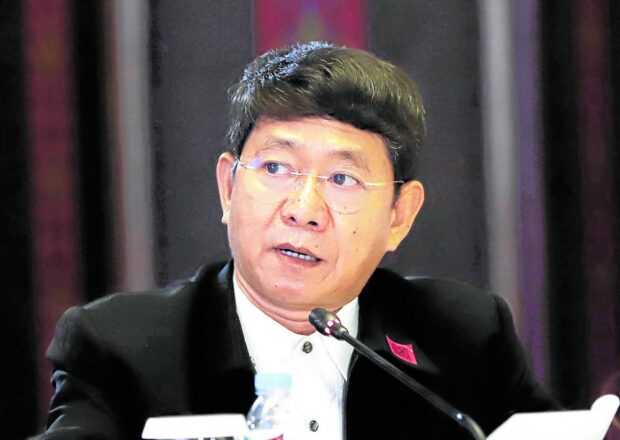
FILE PHOTO: Eduardo Año. MALACAÑANG PHOTO
MANILA, Philippines — National Security Adviser Eduardo Año said Davao del Norte Rep. Pantaleon Alvarez’s call urging the armed forces to withdraw support from President Ferdinand Marcos Jr. is “illegal and unconstitutional” and “seditious.”
Año criticized the remarks and actions of Alvarez, a Navy reservist with the rank of colonel, in a strongly-worded statement on Wednesday.
“Any call for withdrawal of support when done by a public official, more so one that is also a high-ranking reservist officer, is not only irresponsible but also illegal and unconstitutional,” he said.
“Such utterances and actions can be construed as seditious or rebellious and they have no place in our society,” Año added.
Año likewise said Alvarez “severely underestimated the professionalism and integrity” of the Armed Forces of the Philippines (AFP) when he made such an appeal. He emphasized the AFP’s loyalty to the Constitution being a former chief of the armed forces.
READ: DND: Calls to withdraw support from Marcos are ‘futile,’ prosecution likely
“Insinuations to the contrary are baseless and unfounded,” said Año, who was AFP chief of staff during the Duterte administration.
“His words and deeds are a disservice to our men and women in uniform who risk their lives daily to safeguard our nation’s security, defend us from all manner of threats, and uphold the Constitution,” he added.
At a rally in Tagum City on April 14, Alvarez urged the AFP to “peacefully” withdraw their support to Marcos to avert a possible war in the West Philippine Sea. He said a war between China and the Philippines would result in “countless of dead bodies, unimaginable destruction, famine and hunger.”
But the AFP dismissed Alvarez’s call, vowing loyalty to the Constitution and chain of command.
The AFP’s resupply activity for troops in the grounded BRP Sierra Madre on Ayungin (Second Thomas) Shoal and the humanitarian activities in Scarborough Shoal or Bajo de Masinloc have become the flashpoint of tensions between Manila and Beijing in the disputed waters.
Beijing asserts sovereignty over almost the entire South China Sea, including most of the West Philippine Sea, even if such a claim has been effectively invalidated by a July 2016 international tribunal ruling that stemmed from a case filed by Manila in 2013.